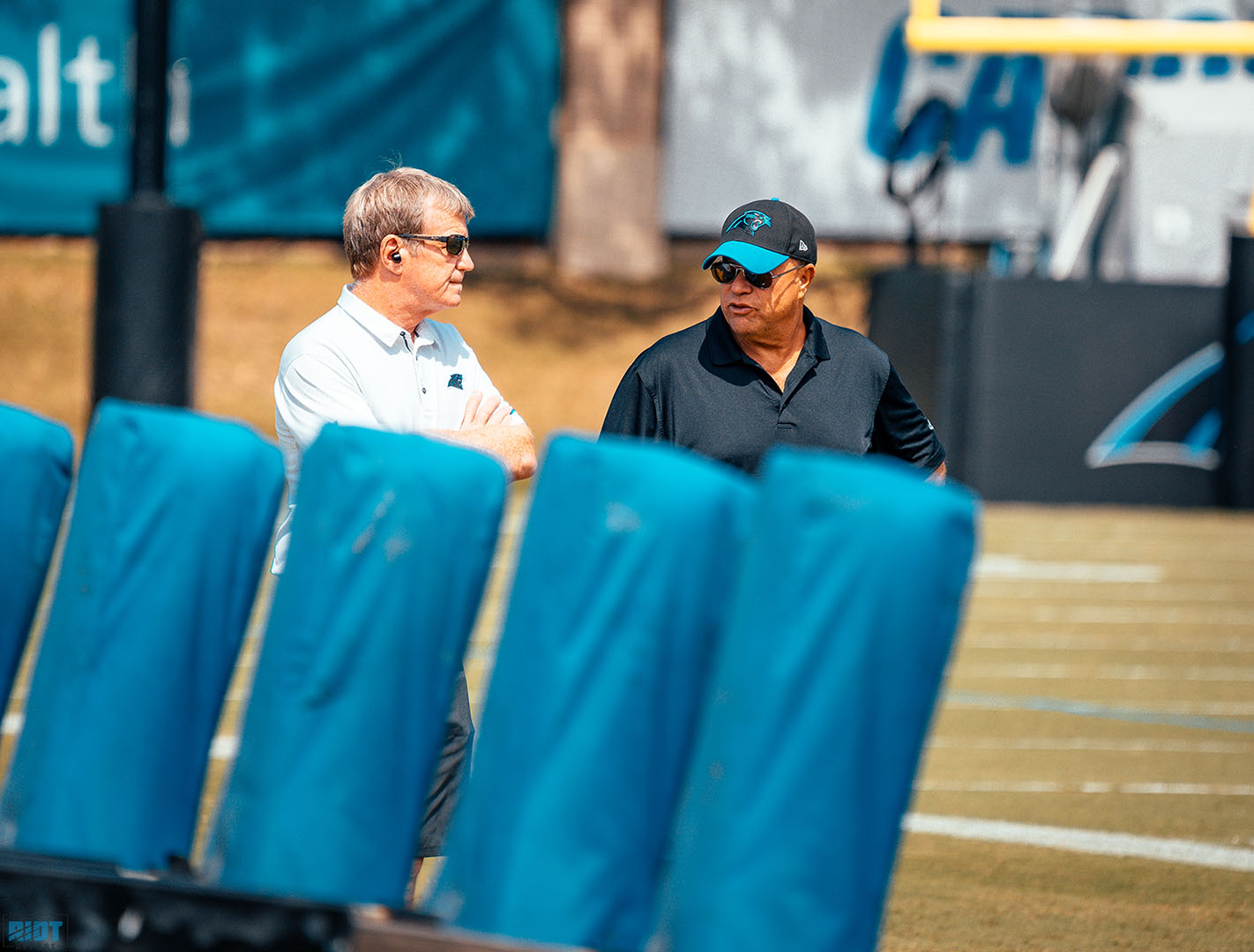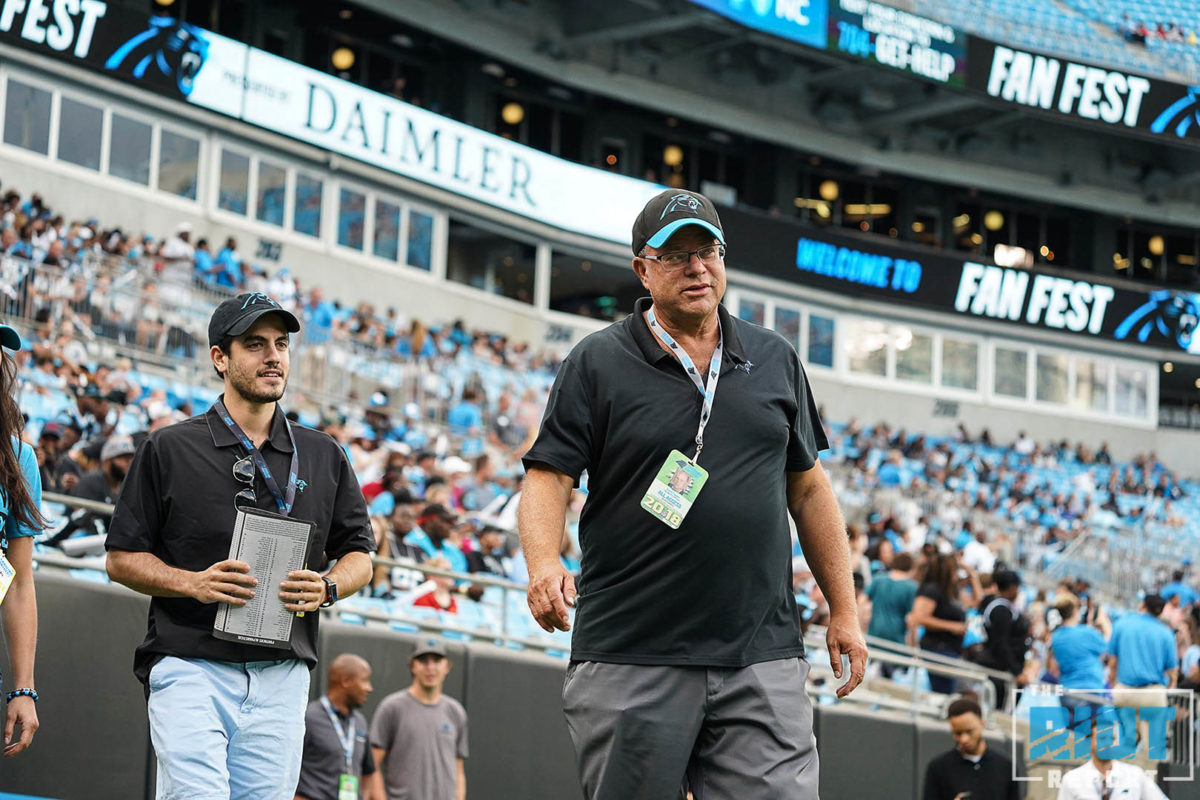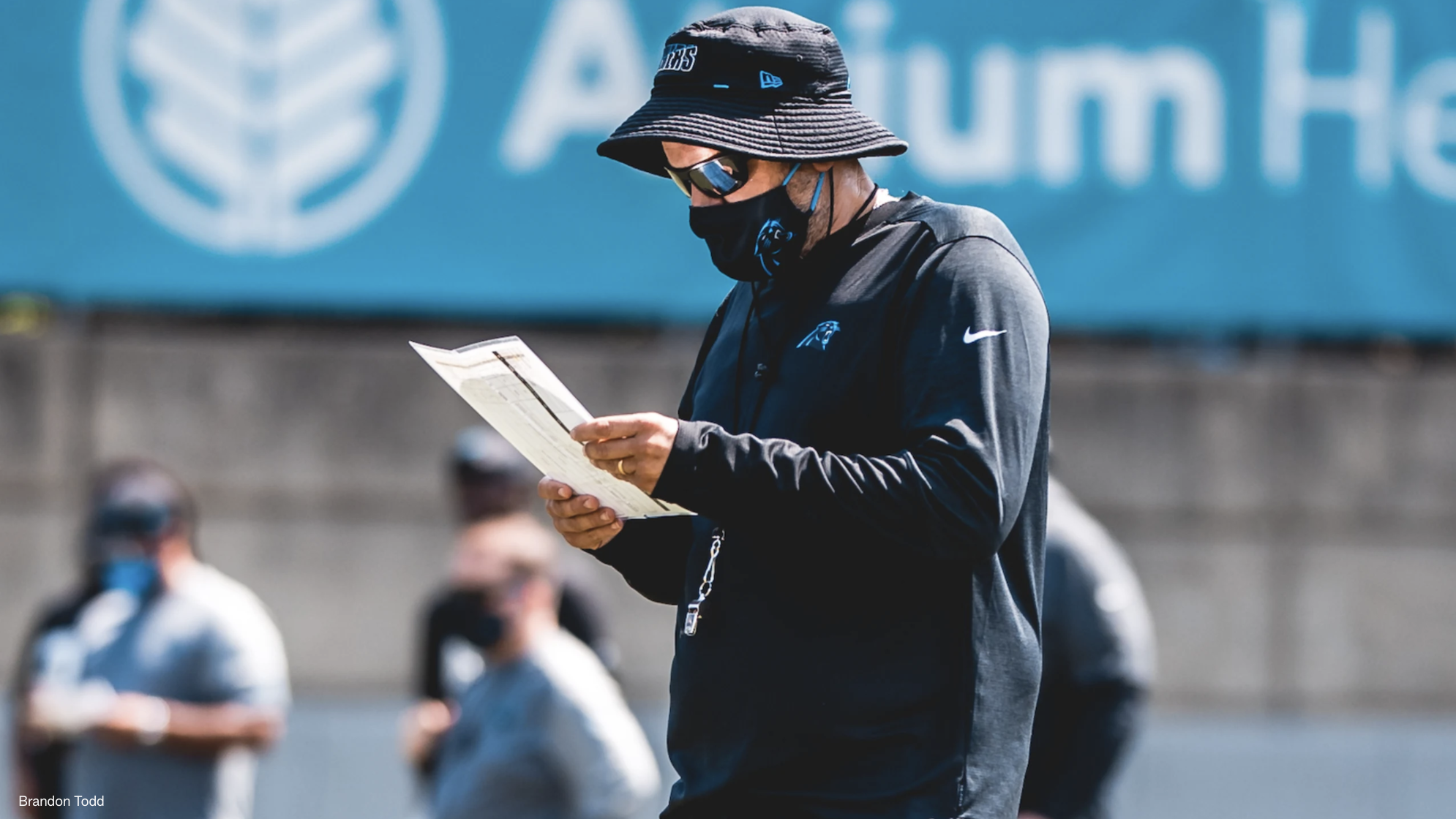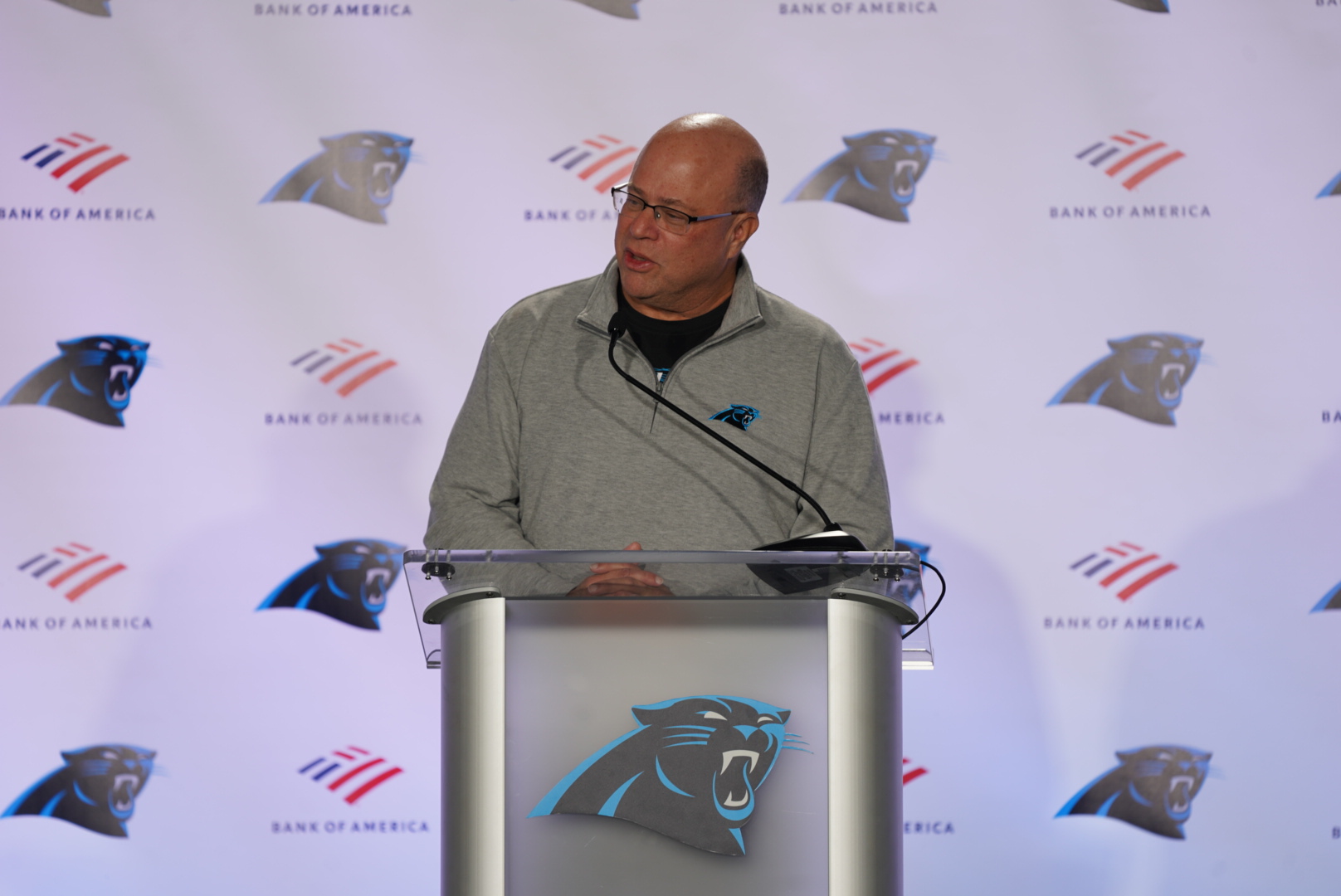The Panthers have parted ways with Marty Hurney with two games left in Matt Rhule’s first season as head coach and will now have a two game headstart on their search for a new GM to take this rebuild forward.
While the timing of this is likely not something that many expected, with the Panthers en route to finishing with a losing record for the third successive season and Hurney about to run out of contract, the Panthers choosing to move on can hardly come as much of a surprise. While this will undoubtedly lead to discussions around both Hurney’s legacy and who might be a suitable candidate to take on the role, Panthers’ owner David Tepper made an interesting observation embedded in the aftermath of the decision.
“I’m trying to figure out what should be the right structure for an organization today,” Tepper told Darin Gantt. “Just because there’s been the same structure in the NFL forever in a lot of places doesn’t mean it should be the same structure now.”
A statement like this should not be ignored, especially as it relates to the multitude of questions this move has ultimately raised.

Ever since Tepper has arrived in Carolina, it has been evident that he is willing to carve his own path – for better or worse – and while change for the sake of change can be a false messiah, a skeptical approach to NFL conventions and assumed truths could and should allow the Panthers to find advantages in successful new approaches. One area where it is clear that the Panthers plan to continue to emphasize is analytics, which again factored into Tepper’s decision.
“I’m a very process-oriented, analytical person. Not that Marty’s not … I think, Matt from the get go, we talked about process, process, process,” Tepper said. “It would have been, a little bit more evolving on Marty’s side on some of these new processes. I guess, new age processes, if you want to call it that.”
From this, it seems clear that the Panthers plan to continue to embrace more data-driven approaches to both game-time decisions, player evaluation and roster construction; what is less clear is exactly how that might work and how this could be integrated alongside a different structure to put the Panthers in a position to build a process to take the Panthers from where they are to where they plan to be and what the road looks like to get them there.
A Different Approach
[mv_video doNotAutoplayNorOptimizePlacement=”false” doNotOptimizePlacement=”false” jsonLd=”true” key=”ypcly0vnuxbfwziradvx” ratio=”16:9″ title=”David Tepper talks Panthers Needs in 2021″ volume=”0″]Most NFL front office seem to operate under the simple delineation of scouting into “Pro” and “College” scouting departments – while there is a fairly simple logic to this, this is one assumption that David Tepper may well want to challenge when putting together his new front office.
Ultimately, you want people doing what they are best at, and that is as true for people in the front office as it is for players or coaches. The role of these departments ultimately falls into four categories; talent identification, talent evaluation, character evaluation and opposition scouting. While not all of these are equally relevant to both pro and college scouting, and the exact form may change slightly between the two, a forward-thinking franchise could look to focus more on what scouts are being asked to do, rather than the context in which they are being asked to do it.
While it is hard to know if this is what Tepper was referring to exactly, it is clear that a more integrated structure is something that he is keen on given his comments on how the Panthers were structured prior to his arrival.
“The Panthers in what was there and how it was structured was very siloed,” said Tepper. “Things were kept separate all over this organization and I don’t like that.”

The Big Cat
While this appeared to refer to how the business side worked, it could also be translated to the front office decision makers. Perhaps a greater focus on a centralized video analysis setup with a small number of road scouts, for example – there’s almost certainly room for that type of setup in Rock Hill. Perhaps the way that the scouting process is done can be more streamlined, which could allow the coaching staff to tailor what they do around the skillsets of the players they have and in turn allows the scouting department to identify players whose skillsets would best fit both with what the coaching staff is trying to implement philosophically and with the talent already on the roster.
Creating an organizational system which maximizes the individual talents available to you while also having an overall coherent structure is far from a trivial endeavor – but if done well, it could allow for a significant competitive advantage.
Lies, Damn Lies and Statistics
David Tepper is clearly eager to bring more data-based decision making into the Carolina front office – coming from his financial background, it is understandable that he would have this approach – and it is certainly true that this is an area where the NFL as a whole is somewhat behind the times. However, while this is absolutely a direction where the Panthers should continue to push forward, they should do so with due care, because throwing your faith behind analytics is no easy process.

The biggest issue with making strong statements based on data in the context of the NFL is the huge number of variables.
On any given play, you have the performance of 22 different players (which can be broken down further into a number of categories), the play call, offensive and defensive formations, the down and distance, clock considerations and the context of the plays before that. Just because the data shows that play-action passes are the most efficient form of play, sometimes you need to run the ball in order to generate such results.
It is therefore important to have an analytics department that is able not only to write the algorithms to process the data into easy-to-use metrics, but also to understand what the data actually represents in the context of the game. This is, of course, easier said than done, and is likely something that will take time to come together – but the Panthers do need to be careful not to be overambitious in what they try and achieve with data alone.
However, there are some key areas where the Panthers could look to make progress.
One important step for teams to make, and something that Pro Football Focus has done a fantastic job of pushing as a concept, is the quantification of performance. You could write several books about how to go about doing this most effectively, but the important point to note at this stage is that by forcing scouts and analysts to quantify not just player performance, but also the different aspects of player performance, you are able to identify trends that might not be evident from subjective descriptors such as “good”, “quite poor” and “struggles with”. Doing this in a rigorous and thorough way is clearly a significant undertaking, and one that will require buy-in from scouts, a restructuring of the evaluation process and likely a significant investment in the front office in terms of personnel in order to account for what will likely be a more time-consuming evaluation process.

Photo Credit: Brandon Todd/Carolina Panthers
Data like this can help chart the progress that players are making – and by extension, it can help to predict reasonable expectations for the development of certain traits and to evaluate different coaching approaches or even specific coaches.
Of course, analysis can extend well beyond the limits of player evaluation, and this is something that Matt Rhule crucially understands.
“We use analytics already, but in terms of where it can go, I think throughout this process as we move forward, that’s one of the things I’m interested to hear and see,” Rhule said Monday. “Obviously, putting together a roster there’s player evaluation, there’s acquisition and there’s also a lot of financial pieces to it. So, I think while analytics is something of a buzzword, it’s really data driven and can go into all those different areas.”
Failing to recognize the potential impact of data in NFL decision making is an inexcusable error for an NFL executive at this point – but treating data as some magic bullet that can completely replace more conventional analysis would be just as foolish.
How the new Panthers’ front office will take shape over the course of the next month or so will be a fascinating process, but if David Tepper is serious about trying to critically reassess how front offices are structured and he is able to get buy-in from those involved while backing the venture with the requisite investment, the Panthers have a chance to enter the post-COVID world as the leader of the pack when it comes to what a front office can be.
And in so doing, they could give the Panthers the best possible chance of securing their first Lombardi trophy – and really, that’s the only number that matters.



